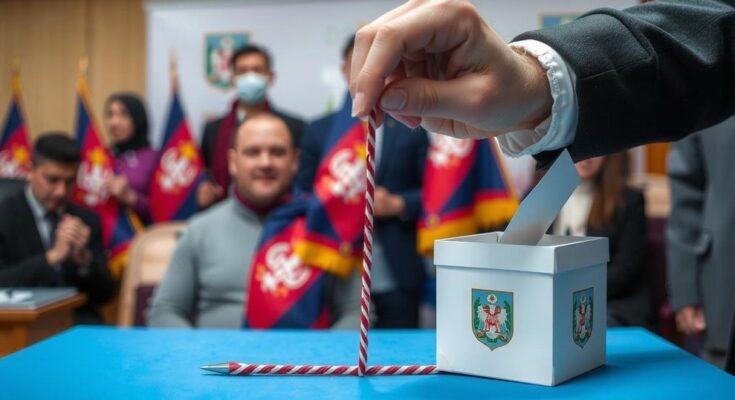Kosovo’s Central Election Commission has banned the main ethnic Serb party, Srpska Lista, from competing in the upcoming parliamentary election due to its nationalist position and connections with Serbia, raising concerns of heightened tensions between Kosovo and Serbia as elections approach.
On Monday, Kosovo’s Central Election Commission made the decisive move to disqualify the main ethnic Serb political party, Srpska Lista, from participating in the forthcoming parliamentary elections. The commission cited the party’s nationalist rhetoric and its deep-seated affiliations with Serbia as reasons for their decision. Notably, the party’s leader, Zlatan Elek, has refrained from acknowledging Kosovo’s status as an independent republic, referring instead to it as “Kosovo i Metohija,” which aligns with the Serbian government’s narrative. Furthermore, the commission expressed concerns regarding Srpska Lista’s close ties to Serbian President Aleksandar Vučić and other Serbian political figures who deny Kosovo’s independence.
This development raises concerns about escalating tensions between Kosovo and Serbia, particularly as Kosovo prepares for parliamentary elections scheduled for February 9. These elections are considered pivotal, serving as a crucial assessment for Prime Minister Albin Kurti, whose party enjoyed a significant victory in the 2021 elections. The backdrop of this political climate is a long-standing conflict; Kosovo, formerly a Serbian province, declared independence in 2008, a status not recognized by Serbia, which continues to regard Kosovo as its territory. This historical context is further complicated by the events of the 1999 NATO bombing campaign that concluded a violent conflict resulting in substantial casualties, predominantly among ethnic Albanians, and led to the withdrawal of Serbian forces from Kosovo.
The current political scenario is deeply rooted in the historical conflicts between Kosovo and Serbia. Kosovo was previously a province of Serbia until it declared independence in 2008, which Serbia does not acknowledge, resulting in ongoing tensions. The ethnic composition of Kosovo, primarily Albanian with a significant Serb minority, has contributed to the complexity of its political situation. The recent decision by the election authority reflects longstanding issues concerning national identity, political representation, and Serbia’s influence over the ethnic Serb community residing in Kosovo. Kosovar elections are of particular importance as they often indicate shifts in power dynamics within the region and are closely monitored by the international community.
The disqualification of Srpska Lista from the upcoming parliamentary elections by Kosovo’s election authority highlights the continuing struggles over national identity and political representation in the region. With the elections on the horizon, the potential for increased tension exists, particularly as the international community seeks to mediate relations between Kosovo and Serbia. This decision also poses significant implications for Prime Minister Albin Kurti and his government’s mandate, as the outcome of the elections could reshape the political landscape in Kosovo.
Original Source: abcnews.go.com




